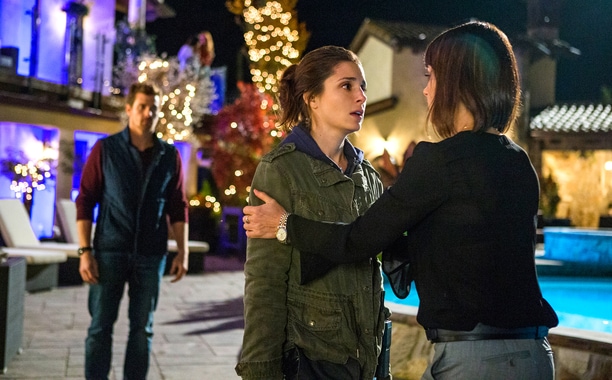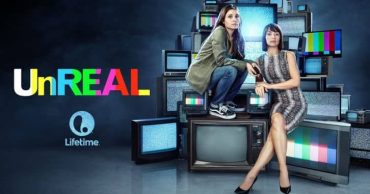
With Mary’s suicide looming over the set of Everlasting, UnREAL and the show it depicts open in a precarious light in “Savior.” How would the show go on? How could the show go on, either on the set of Everlasting, or on UnREAL itself, with production of its fictional show shut down? The opening moments of “Savior” refuse to provide a clear answer to that question; and yet, as “Savior” unfolds, UnREAL regains its sharp focus on its characters, and somehow manages to get things back on the rails by the end of the hour.
Mary’s death is really another litmus test for the humanity of the individuals in front and behind the cameras of Everlasting; nothing makes people look in the mirror and take stock of their lives more than death, and “Savior” is an hour full of reflection, even when heavily invested in its dramatic material, which involves Quinn, Chet, and Rachel navigating the network and the police as they try and figure out what to do with the information they have (that is, Shia messing with Mary’s medication). It’s an hour that once again retains its intense focus on the conscience of our main characters; and in that, explores a number of interesting wrinkles.
Boiled down to its essence, “Savior” is about duplicity; about saying we’re doing one thing, while in honesty, our purpose is much more self-serving. Rachel wants to save her job so she goes on a crusade for justice against Kirk, Quinn wants to save the show so she films the girl’s reactions for the police… these stories are all designed to explore the idea of moralistic intent, and whether such a thing even exists, even in the most expected of places (like the scene of a woman’s suicide). For some, its an enlightening moment; Chet realizes what Quinn does to save him, and Shia takes note that she’s gone way, way too far this time. Others can’t even be shook by the death around them; Jeremy works his “noble” crap on Rachel, having sex with her under the pretense of being “there for her” (so much for being a nice guy, right?), and stuffy executive Brad is on set trying to find a scapegoat and maintain power, hiding under the pretensions of finding out “the truth” in his pursuit to blame it all on somebody, preferably Quinn.
All of these stories bring out the duality of its complex characters; in some places it makes for a bit of an awkward fit (Jeremy’s behavior, or Mia’s sudden decision to quit), but it injects the season’s running themes with existential crises: these are characters examining their very souls, and finding out they come up wanting. Rachel doesn’t climb into Adam’s bed for sex; it’s because she’s coming to terms with the kind of human being she is, struggling to reconcile her timid conscience with her raging ambition (and financial needs; lest we forget, she’s still living in an electrical truck). Where it felt like “Fly” was leaning too heavily to the judgmental side of the spectrum with the sheer manipulation of Mary’s life and circumstances, “Savior” backs up a bit, even letting us believe for a moment that maybe Rachel’s note actually came from Mary before she died – of course it didn’t, but giving us that hope for a few minutes is of paramount importance to the emotional journey it wants the audience to take. Can we accept what they do, like Louise did, in the name of something better (for Louise, keeping Lilybelle safe), or are we full on act-one Adam, screaming at the screen about what monsters they all are?
I’ve said all season that complexity is the true beauty of UnREAL; beyond its social observations and societal critiques, how the show depicts both light and dark within each character of its cast is unparalleled on television. There’s a reason why Quinn’s composed face at the end of the episode is such a powerful moment, or why Shia’s emotional breakdown this episode is almost an empathetic moment. UnREAL understands that there really is no thing as objective good and evil; different moments call for different measures, and how “Savior” picks up on that thread of humanity is what turns this hour from good, to exceptional.
Other thoughts/observations:
– Jay is a terrible friend – but we all knew that already, right?
– Quinn, spitting gold: “They want the truth like I want pube lice.”
– Adam compares himself to Edward Snowden; chill out, buddy.
– Chet: “Keep it upbeat – but also, somebody died.”
– Even though Ashley Scott is gone, the Dark Angel reunion continues when Fulvio Cecere (who played Richard Sandoval on DA) appears on the Everlasting set with Martin Cummins. This is quickly becoming one of my favorite little in-episode games to play.
[Photo via Lifetime]
 Follow Us
Follow Us





